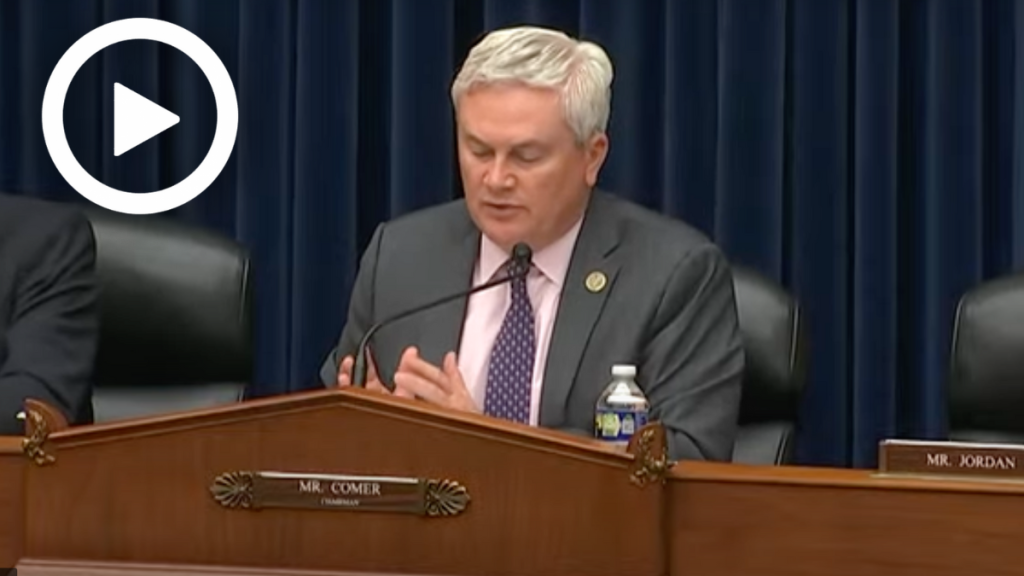Comer: The FDA Has Failed to Prioritize Safety and Incentivize Innovation
WASHINGTON—House Committee on Oversight and Accountability Chairman James Comer (R-Ky.) today opened a hearing titled “Oversight of the U.S. Food and Drug Administration” to bring transparency to a pattern of issues within the U.S. Food and Drug Administration (FDA) to ensure the FDA is prioritizing safety and effectiveness and incentivizing innovation.
Below are Chairman Comer’s remarks as prepared for delivery.
Welcome to the Committee on Oversight and Accountability.
We thank Commissioner Califf for his participation in today’s oversight hearing of the U.S. Food and Drug Administration.
There might not be a federal agency that is more integral to Americans’ day-to-day lives than the FDA.
FDA is charged with regulatory oversight of the food and drug industries.
Industries that ensure Americans have food on the table by innovating safer and more stable crops.
Industries that provide Americans new medications to treat debilitating diseases.
Industries that create cutting-edge medical devices that can keep your heart pumping or help replace a knee.
These industries are vital to keep Americans safe, healthy, and happy.
These industries provide millions of jobs and nearly $3 trillion in economic value.
Congress must ensure the FDA is prioritizing safety and effectiveness but also incentivizing innovation.
Unfortunately, the FDA under President Biden is suffering from dysfunction and is failing to do the bare minimum to carry out its core mission—make certain our nation’s food and drug products are safe and effective.
Further, the FDA appears consistently unprepared for crises.
That is why our Committee has conducted several investigations into areas of concern at the FDA. These investigations have identified a pattern of issues within the FDA.
At the beginning of the Congress, Subcommittee Chairwoman McClain launched an investigation into the infant formula crisis.
Her Subcommittee revealed how the FDA attempted to hide behind the COVID-19 pandemic as an excuse for neglecting facility inspections and justifying poor performance.
The FDA’s telework policies and lax approach to oversight left it unprepared to address the shortages when Abbott’s facility in Sturgis, Michigan was shut down.
Additionally, the Biden White House and the FDA took three months to act to increase production of infant formula.
The result of these failures?
Barren shelves, leaving millions of young families unable to access the formula needed to feed their babies.
We have also investigated the FDA’s failure to prepare for and adequately respond to drug shortages for essential medications used to treat infection, heart disease, and cancer, just to name a few examples.
FDA and Democratic policies, such as the Inflation Reduction Act, have dramatically diminished the profitability of manufacturing generic medications. This has resulted in fewer manufacturers and a greater risk of shortage.
The FDA must improve coordination with manufacturers and federal agencies, including DEA, DOJ, and DOD to increase production.
The FDA has failed to incentivize domestic manufacturing of pharmaceuticals resulting in significant off-shoring of these facilities.
We conducted oversight of the FDA’s failure to return to pre-pandemic levels of inspections of those manufacturing facilities for prescription drugs abroad.
Inspections of foreign manufacturing facilities were 79 percent lower in 2022 than 2019.
Last year alone, this failure resulted in two separate recalls of eye drops manufactured in India that caused an outbreak of dangerous drug-resistant bacteria killing four people.
Through our investigation of tobacco products regulations, we learned the FDA is failing to consistently and effectively regulate tobacco products.
According to the Reagan-Udall Foundation, the FDA has been “reactive and overwhelmed” in its tobacco products regulation.
The FDA has delayed review of applications for products that can reduce harm for many Americans.
Further, the FDA’s failure to regulate has allowed unsafe and illicit products to proliferate.
In fact, the United States Court of Appeals for the Fifth Circuit slammed the FDA for “[sending] manufacturers of flavored e-cigarette products on a wild goose chase.”
Meanwhile, the FDA is also failing to prevent illicit flavored tobacco products from China entering the country and harming Americans.
The FDA is not implementing enforcement actions to address illicit flavored tobacco products in stores across the country.
Additionally, the Committee examined the FDA’s refusal to regulate hemp-derived products such as CBD.
Instead of using its existing authorities, the FDA is requesting new authorities and money that it does not need. This is the FDA putting its own bureaucratic priorities over the American people who can benefit from these products.
The FDA’s refusal to regulate hemp products is creating significant confusion in the market and resulting in products with intoxicants that may be dangerous to Americans who use these products.
It has also halted businesses trying—in good faith—to enter the market, while bad actors continue to thrive.
Finally, we have found that the FDA ignored decades of research regarding the ineffectiveness of an over-the-counter decongestant causing Americans to waste their hard-earned money on a medication that is simply ineffective.
These examples are just scratching the surface of the dysfunction and failures that are ongoing within the FDA.
Today I’m hopeful we can take a deep dive to better understand how the FDA is responding and taking action to ensure a safe food and drug supply.
I now yield to the Ranking Member.
